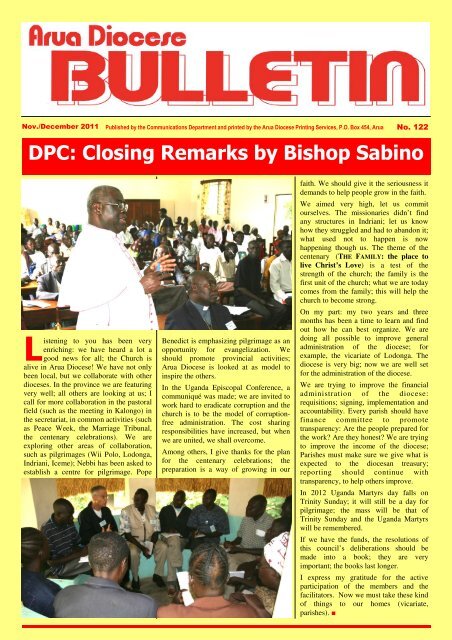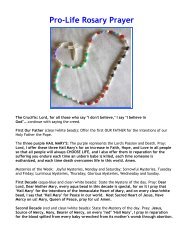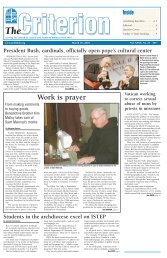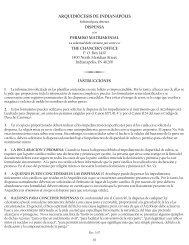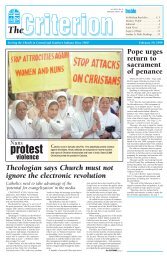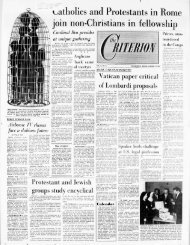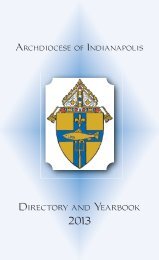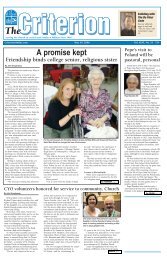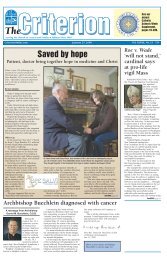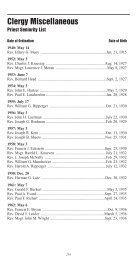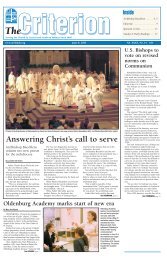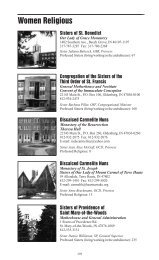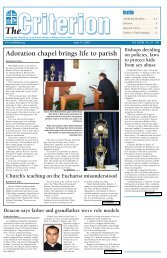Arua Diocese Bulletin -- November/December 2011
Arua Diocese Bulletin -- November/December 2011
Arua Diocese Bulletin -- November/December 2011
Create successful ePaper yourself
Turn your PDF publications into a flip-book with our unique Google optimized e-Paper software.
Nov./<strong>December</strong> <strong>2011</strong><br />
Published by the Communications Department and printed by the <strong>Arua</strong> <strong>Diocese</strong> Printing Services, P.O. Box 454, <strong>Arua</strong><br />
No. 122<br />
DPC: Closing Remarks by Bishop Sabino<br />
L<br />
istening to you has been very<br />
enriching: we have heard a lot a<br />
good news for all; the Church is<br />
alive in <strong>Arua</strong> <strong>Diocese</strong>! We have not only<br />
been local, but we collaborate with other<br />
dioceses. In the province we are featuring<br />
very well; all others are looking at us; I<br />
call for more collaboration in the pastoral<br />
field (such as the meeting in Kalongo) in<br />
the secretariat, in common activities (such<br />
as Peace Week, the Marriage Tribunal,<br />
the centenary celebrations). We are<br />
exploring other areas of collaboration,<br />
such as pilgrimages (Wii Polo, Lodonga,<br />
Indriani, Iceme); Nebbi has been asked to<br />
establish a centre for pilgrimage. Pope<br />
Benedict is emphasizing pilgrimage as an<br />
opportunity for evangelization. We<br />
should promote provincial activities;<br />
<strong>Arua</strong> <strong>Diocese</strong> is looked at as model to<br />
inspire the others.<br />
In the Uganda Episcopal Conference, a<br />
communiqué was made; we are invited to<br />
work hard to eradicate corruption and the<br />
church is to be the model of corruptionfree<br />
administration. The cost sharing<br />
responsibilities have increased, but when<br />
we are united, we shall overcome.<br />
Among others, I give thanks for the plan<br />
for the centenary celebrations; the<br />
preparation is a way of growing in our<br />
faith. We should give it the seriousness it<br />
demands to help people grow in the faith.<br />
We aimed very high, let us commit<br />
ourselves. The missionaries didn’t find<br />
any structures in Indriani; let us know<br />
how they struggled and had to abandon it;<br />
what used not to happen is now<br />
happening though us. The theme of the<br />
centenary (THE FAMILY: the place to<br />
live Christ’s Love) is a test of the<br />
strength of the church; the family is the<br />
first unit of the church; what we are today<br />
comes from the family; this will help the<br />
church to become strong.<br />
On my part: my two years and three<br />
months has been a time to learn and find<br />
out how he can best organize. We are<br />
doing all possible to improve general<br />
administration of the diocese; for<br />
example, the vicariate of Lodonga. The<br />
diocese is very big; now we are well set<br />
for the administration of the diocese.<br />
We are trying to improve the financial<br />
administration of the diocese:<br />
requisitions; signing, implementation and<br />
accountability. Every parish should have<br />
finance committee to promote<br />
transparency: Are the people prepared for<br />
the work? Are they honest? We are trying<br />
to improve the income of the diocese;<br />
Parishes must make sure we give what is<br />
expected to the diocesan treasury;<br />
reporting should continue with<br />
transparency, to help others improve.<br />
In 2012 Uganda Martyrs day falls on<br />
Trinity Sunday; it will still be a day for<br />
pilgrimage; the mass will be that of<br />
Trinity Sunday and the Uganda Martyrs<br />
will be remembered.<br />
If we have the funds, the resolutions of<br />
this council’s deliberations should be<br />
made into a book; they are very<br />
important; the books last longer.<br />
I express my gratitude for the active<br />
participation of the members and the<br />
facilitators. Now we must take these kind<br />
of things to our homes (vicariate,<br />
parishes). ■<br />
<strong>Arua</strong> <strong>Diocese</strong> <strong>Bulletin</strong> 1<br />
<strong>November</strong> / <strong>December</strong><strong>2011</strong>
Pope Benedict’s Africa plan: Stay spiritual, and stay Catholic<br />
P<br />
ope Benedict XVI came to Africa<br />
primarily to deliver his<br />
conclusions from a 2009 Synod of<br />
Bishops for Africa. He chose an<br />
evocative setting – the city of Ouidah on<br />
Benin’s Atlantic coast, a onetime slave<br />
port known as the spiritual capital of the<br />
Vodun religion, referred to in the West as<br />
voodoo.<br />
Benedict’s 138-page document on<br />
Africa, titled Africae Munus, or<br />
“Africa’s Commitment,” contains a<br />
bewildering variety of specifics, but its<br />
core boils down to two pleas to Africa’s<br />
roughly 150 million faithful: Stay on the<br />
spiritual plane, as opposed to becoming a<br />
political party, and stay Catholic.<br />
In effect, Benedict argues throughout the<br />
text that the best contribution<br />
Catholicism can make to reconciliation,<br />
justice and peace in Africa, which was<br />
the theme of synod, is by fulfilling its<br />
spiritual mission – reconciling humanity<br />
to God and one another through Christ.<br />
Preaching the gospel, promoting the<br />
sacraments, and saving souls, the pope<br />
implied, is the distinctive contribution of<br />
the church to the quest for peace and<br />
justice.<br />
“To deprive the African continent of<br />
God would be to make it die a slow<br />
death, by taking away its very soul,” the<br />
pope warned.<br />
“The church’s mission is not political in<br />
nature,” the pope writes at one point, and<br />
at another he adds that “Christ does not<br />
propose a revolution of a social or<br />
political kind.”<br />
The temptation to direct political<br />
engagement may be especially strong in<br />
Africa, where religious bodies are often<br />
the most trusted exponents of civil<br />
society and of resistance to corrupt<br />
regimes.<br />
Benedict also called on African Catholics<br />
to take their cues from church teaching<br />
and tradition, as opposed to an<br />
excessively “African” form of the faith.<br />
He referred to “dual affiliation”, meaning<br />
Catholics who also practice tribal<br />
religions, as a serious problem.<br />
Much of the specific content of Africae<br />
Munus is already familiar, but two<br />
distinct themes stand out.<br />
First, Benedict clearly links the push to<br />
fight corruption in political and economic<br />
life to the need for good government<br />
inside the church itself.<br />
Speaking to Africa’s bishops, Benedict<br />
writes: “To make your message<br />
credible, see to it that your dioceses<br />
<strong>November</strong> / <strong>December</strong> <strong>2011</strong><br />
become models in the conduct of<br />
personnel, in transparency and good<br />
financial management.” “Do not<br />
hesitate to seek help from experts in<br />
auditing, so as to give a good example<br />
to the faithful and to society at large,”<br />
the pope writes.<br />
At another point, Benedict insists that<br />
church employees must receive “just<br />
remuneration … in order to<br />
strengthen the church’s credibility.”<br />
He also directs a similar message to<br />
church-affiliated health care institutions,<br />
insisting that “the management of grant<br />
monies must aim at transparency.”<br />
Second, this theologian-pope encouraged<br />
the bishops of Africa to take a special<br />
interest in “the life of the intellect and<br />
reason, so as to foster a habit of rational<br />
dialogue and critical analysis within<br />
society and in the church.” “Perhaps this<br />
century will permit, by God’s grace, the<br />
rebirth on your continent, albeit surely in<br />
a new and different form, of the<br />
prestigious School of Alexandria,” the<br />
pope writes.<br />
In terms of other specifics, Africae<br />
Munus contains a wide variety of papal<br />
recommendations and injunctions. They<br />
include: An endorsement of truth and<br />
reconciliation commissions, stressing<br />
that reconciliation must not come at the<br />
expense of accountability. It must<br />
include, he writes, “the pursuit of those<br />
responsible for these conflicts, those who<br />
commissioned crimes and who were<br />
involved in trafficking of all kinds, and<br />
the determination of their responsibility.<br />
Victims have a right to truth and justice.”<br />
The church’s responsibility to act as a<br />
“sentinel” in denouncing injustice. The<br />
church, the pope writes, “feels the duty to<br />
be present wherever human suffering<br />
exists and to make heard the silent cry of<br />
the innocent who suffer persecution, or<br />
of peoples whose governments mortgage<br />
the present and future for personal<br />
interests.”<br />
A strong plug to defend the rights and<br />
role of women. “Women’s dignity and<br />
rights, as well as their essential<br />
contribution to the family and to society,<br />
have not been fully acknowledged or<br />
appreciated,” the pope writes. “The<br />
church has the duty to contribute to<br />
the recognition and liberation of<br />
women” and to promote for them “a<br />
place in society equal to that of men.”<br />
Urging political leaders to combat<br />
poverty and to protect the environment.<br />
“Fundamental goods such as land and<br />
water,” the pope writes, are critical for<br />
“the human life of present and future<br />
generations and for peace between<br />
peoples.”<br />
Endorsement of good government and<br />
anti-corruption efforts.<br />
Support for dialogue with Muslims,<br />
coupled with insistence on respect for<br />
freedom of belief and worship.<br />
“Religious freedom is the road to peace,”<br />
the pope writes.<br />
Many experts have predicted an “African<br />
moment” in the global church in the 21st<br />
century, given Catholicism’s explosive<br />
growth here. (The Catholic population of<br />
sub-Saharan Africa grew almost 7,000<br />
percent during the 20th century.) One<br />
foretaste of that “African moment” has<br />
been the rapid growth in African priests<br />
serving outside the continent, especially<br />
in Europe and North America.<br />
Despite the fact that the priest shortage is<br />
actually far more acute in Africa than in<br />
the West – the priest-to-person ratio is<br />
the United States is 1-1,300, while in<br />
sub-Saharan Africa it’s almost 1-5,000 --<br />
- Benedict encouraged what observers<br />
often refer to as the “reverse mission,”<br />
meaning African priests serving in the<br />
Western societies which once dispatched<br />
missionaries to Africa.<br />
The pope called on African bishops to<br />
“respond generously to the requests of<br />
their confreres in countries lacking<br />
vocations, and assist the faithful deprived<br />
of priests.” ■<br />
Excerpts from an article in the NCR<br />
by John L. Allen Jr.<br />
2 <strong>Arua</strong> <strong>Diocese</strong> <strong>Bulletin</strong>
B<br />
FROM ROM THE THE BISHOP BISHOP<br />
ISHOP’S ISHOP OFFICE O FFICE<br />
Fr. Paul Opoky, AJ, appointed curate of Ajumani Parish,<br />
effective 25 <strong>November</strong> <strong>2011</strong>.<br />
Fr. Guma Felix, appointed acting parish priest of Maracha Parish,<br />
effective January 2012.<br />
Fr. Asiku Alfred, appointed acting in-charge/temporary overseer of <strong>Arua</strong><br />
House-Muyenga, effective January 2012.<br />
Fr. Buni Richard, appointed parish priest of Ocodri Parish, effective<br />
January 2012.<br />
Fr. Inyaga Andrew, appointed teacher and formator at Pokea Seminary,<br />
effective January 2012.<br />
Fr. Bekia Vincent, appointed bursar and formator at Pokea Seminary,<br />
effective January 2012.<br />
Fr. Eneku Richard, appointed acting parish priest of Logiri Parish and<br />
chaplain of Logiri Girls SSS, with residence there, effective<br />
January 2012.<br />
Fr. Amudra Kasto Thomson, appointed caretaker of Tara Sub-Parish,<br />
with residence there, effective January 2012.<br />
Fr. Acidri Constantine, continuing as assistant director of Caritas <strong>Arua</strong>,<br />
appointed curate of Vurra Parish, with residence at Caritas<br />
House, <strong>Arua</strong>, effective 14 th October <strong>2011</strong>.<br />
Fr. Amandua Lucas, appointed chaplain of Maracha Hospital, with<br />
residence at Maracha Parish, effective 14 th October <strong>2011</strong>.<br />
Fr. Matua Valentine, continuing as executive secretary of diocesan land<br />
commission, appointed chaplain of <strong>Arua</strong> Prison and chaplain at<br />
Mandela Comprehensive SSS, with residence at Christus<br />
Centre, effective 14 th October <strong>2011</strong>.<br />
Fr. Orionzi Samuel, appointed curate of Ocodri Parish, with residence<br />
there, effective 14 th October <strong>2011</strong>.<br />
Fr. Sancte Eriku, appointed chaplain of Otumbari SSS and curate of<br />
Otumbari Parish, with residence there,<br />
effective 24 th October <strong>2011</strong>.<br />
Fr. Candia Drandua Fred, appointed in-charge of the diary of the<br />
bishop’s house, with residence there,<br />
effective 24 th October <strong>2011</strong>.<br />
Fr. Awide Joseph, appointed chaplain of Daughters of Merciful Love of<br />
Jesus and Mary Queen of Apostles and appointed parish priest<br />
of Otumbari Parish, with residence there,<br />
effective 26 th October <strong>2011</strong>.<br />
Fr. Ongom David Steve, appointed parish priest of Ajumani Parish,<br />
effective 26 th October <strong>2011</strong>.<br />
Fr. Kasozi Frederick, appointed vice-rector at Pokea Seminary,<br />
effective 27 th October <strong>2011</strong>.<br />
Fr. Alex Matua MCCJ, appointed curate of Ombaci Parish and chaplain<br />
of St. Joseph College Ombaci, effective 23 <strong>November</strong> <strong>2011</strong>.<br />
<strong>Arua</strong> <strong>Diocese</strong> <strong>Bulletin</strong> 3<br />
<strong>November</strong> / <strong>December</strong><strong>2011</strong><br />
O
From the Family Life Desk<br />
Christmas and New Year<br />
message to all married<br />
couples of <strong>Arua</strong> <strong>Diocese</strong><br />
A<br />
s we prepare to receive our Lord<br />
Jesus Christ and also prepare to<br />
celebrate the 100 th year of the<br />
existence of the Catholic faith in <strong>Arua</strong><br />
<strong>Diocese</strong>, let us reflect on the theme for<br />
the centenary: THE FAMILY: the place to<br />
live Christ’s Love. This theme puts<br />
forward the position of the family on the<br />
forefront. We are therefore charged<br />
responsible to ensure love in our family<br />
for the family members and also<br />
neighbors. This calls upon all stake<br />
holders in the family to stamp out any<br />
form of domestic violence and continue<br />
to make peace in the family. The theme<br />
for the Family Life Desk for the year is<br />
“the two shall become one”. Also the<br />
theme for the Catholic <strong>Diocese</strong> of Nebbi<br />
was: “You will be my witness from the<br />
family to the ends of the world”. We too<br />
are called to be witnesses of the Jesus<br />
Christ. We can be witness only if we<br />
allow Christ to reign in our family and<br />
accept Him as the family head. For us<br />
Catholics we show this by celebrating the<br />
<strong>November</strong> / <strong>December</strong> <strong>2011</strong><br />
sacraments, especially the sacrament<br />
of marriage (Matrimony).<br />
These themes could help us to<br />
celebrate the coming events more<br />
meaningfully. But other earthly<br />
things prevent us from celebrating<br />
the sacraments; these include:<br />
alcoholism & drug abuse, polygamy,<br />
greed, poverty due to laziness,<br />
witchcraft, poor birth control<br />
methods and many others. To<br />
celebrate the birth of Jesus and the<br />
centenary of our faith we have to<br />
avoid these vices to make our family<br />
the place to live Christ’s love.<br />
Those who have not celebrated the<br />
sacraments to the full should make<br />
efforts to do so in the coming year<br />
and those who have already<br />
celebrated the sacrament of<br />
matrimony should constantly pray so<br />
that they keep their promises and<br />
they can be seen as examples of<br />
Gods’ Children for others to follow,<br />
as you are called to let your light<br />
shine (Mat 16:5).<br />
By this message we wish you a<br />
Blessed New Year 2012. ■<br />
From KALUCA<br />
D<br />
uring a fundraising<br />
held at St.<br />
J o s e p h<br />
Kawolokota Lugbara<br />
community chapel in<br />
K i t i m b w a P a r i s h ,<br />
Kayunga district on<br />
Saturday 29 th October<br />
<strong>2011</strong>, UGX 871,000 cash<br />
and UGX 560,000 in<br />
pledges was realized. The<br />
chairperson of the COC,<br />
Mr. Aruku Gasper, said<br />
that the fund-raising was<br />
specifically to increase the income of the<br />
chapel and acquire a piece of a land to<br />
carry out income-generating projects like<br />
agriculture and brick making, among<br />
others. He also cited some challenges<br />
such as poor cooperation, lack of unity,<br />
low income and negative attitude from<br />
some Christians. The chairperson of Zone<br />
D under Kampala Lugbara Catholic<br />
Association (KALUCA), Mr. Alsandu<br />
Candia, thanked the Christians for their<br />
generous contributions. He further urged<br />
Christians to support, cooperate and unite<br />
with their leaders in order to bring up<br />
development in the chapel. He also<br />
encouraged their Christians to participate<br />
in church income-generating projects like<br />
agriculture. The chief catechist of Zone<br />
D, Mr. Joseph Enga Emvi, cautioned the<br />
Christians to live exemplary Christian life<br />
and be practical in their faith. He further<br />
urged the Christians to live in unity as<br />
Christians. ■<br />
By Ajuni Charles,<br />
Communication Secretary Kampala<br />
Adrabo Atiku Robert and Draru Joyce Adrabo<br />
Family Life Desk, <strong>Arua</strong> <strong>Diocese</strong><br />
From Lodonga<br />
Vicariate<br />
S<br />
tudents and tutors of<br />
Lodonga SPACE and<br />
Maracha Pastoral Training<br />
centres have been advised to<br />
encourage team work spirit among<br />
themselves to improve pastoral<br />
activities in <strong>Arua</strong> <strong>Diocese</strong>. Msgr.<br />
Mathias Miria, the Episcopal Vicar<br />
of Lodonga Vicariate, gave the<br />
advice during the farewell party<br />
organized for Fr. Angelo Nyatibo<br />
on 29 September <strong>2011</strong>. Msgr.<br />
Miria said unity, love, peace are<br />
ways that bring happiness and<br />
success in institutions. Students<br />
and Christians gave described Fr.<br />
Nyatibo as a social, committed,<br />
and dedicated person. Fr. Nyatibo<br />
had served for two years in<br />
Lodonga SPACE. He is now<br />
director of Maracha P.T.C. ■<br />
By Martin Ajobe<br />
Communication Secretary<br />
4 <strong>Arua</strong> <strong>Diocese</strong> <strong>Bulletin</strong>
From All Saints Parish, Oluvu<br />
T<br />
he Bishop of <strong>Arua</strong> <strong>Diocese</strong>, Rt.<br />
Rev. Sabino Ocan Odoki, has<br />
pledged to support the proposed<br />
Kamaka Sub-Parish by giving iron sheets<br />
for roofing the twelve roomed priests<br />
house if the wall which is at beam level is<br />
completed. He made this offer on 30 th<br />
October <strong>2011</strong> during a confirmation<br />
ceremony at Kamaka Zone of Oluvu<br />
Parish. The Bishop appealed to those<br />
Christians who have not yet completed<br />
their contributions for the expansion and<br />
renovation of Ediofe Cathedral and their<br />
contributions to the major seminarians to<br />
do so before it is too late.<br />
Through a memorandum read by<br />
Mademaga Kenneth, the project vice<br />
chairman, the Christians appealed for the<br />
declaration of the proposed Kamaka Sub-<br />
Parish. In response, the bishop gave a go<br />
ahead for the Dean of Maracha Deanery,<br />
Episcopal Vicar of Lodonga Vicariate<br />
and the people of the proposed Sub-<br />
Parish to sit for a meeting in relation to<br />
the boundaries for the Sub-Parish so that<br />
the declaration will be made after the<br />
issues of the boundaries are settled.<br />
Fr. Casto Amudra, the dean of Maracha<br />
Deanery, urged the Christians of Kamaka<br />
Zone to support religious leaders from<br />
small Christian community level to the<br />
highest levels, especially seminarians<br />
saying there can’t be a Sub-Parish<br />
without a priest.<br />
Fr. Paul Maguma, the parish priest of<br />
Oluvu Parish, appealed to the people of<br />
Kamaka Zone to be open-minded and<br />
show cooperation towards Oluvu, the<br />
mother parish, as they continue to<br />
demand for sub-parish status.<br />
C<br />
hristians of St. John Bosco Chapel<br />
Onzua celebrated the hand-over<br />
ceremony for their newly<br />
transferred catechist Michael Adrama on<br />
20 th <strong>November</strong> <strong>2011</strong>. The mass was led<br />
by Rev. Fr. Saul Bileyo Amaza, the<br />
curate of Aripea Parish. While preaching<br />
from the gospel according to St. Mathew<br />
chapter 1 verses 10-15, Fr. Saul said<br />
catechist Adrama was sent to spread the<br />
good news of God among the Christians<br />
of Onzua Chapel.<br />
The parish church of Oluvu while under renovation years ago.<br />
L<br />
ater, Bishop Emeritus Frederick<br />
Drandua encouraged the people of<br />
Oluvu Parish not to expect help<br />
from donors but to form SACCO groups<br />
to generate income to support the church<br />
and their families. He gave this<br />
encouragement on 1 st <strong>November</strong> <strong>2011</strong> in<br />
Oluvu Parish during the celebration of<br />
All Saints Oluvu parish day.<br />
Mary Anecho, the resident district<br />
commissioner of Maracha District who<br />
was the guest of honour for the<br />
celebration, thanked the people of Oluvu<br />
Parish for utilizing the funds which were<br />
collected during the fund-raising held in<br />
August; evidence of this was shown by<br />
the comprehensive and detailed<br />
accountability which was read by Mr.<br />
Afedra Charles, the Parish FPD chairman.<br />
Some of the projects that were<br />
From St. Peter Claver Parish, Aripea<br />
He asked the Christians to give support to<br />
their catechist as much as possible. After<br />
the mass, the 22 Christian communities<br />
gave their gifts which totaled UGX<br />
174,500.<br />
undertaken include: installation of a<br />
lighting system in the church and the<br />
priests’ house; painting; purchase of<br />
benches; and completing the work of the<br />
parish hall.<br />
Mr. Adripio Emmanuel, the LCV<br />
chairperson of Maracha District, appealed<br />
to the people of Maracha to start simple<br />
projects like chicken rearing, planting<br />
onions, tomatoes and cabbages as means<br />
of generating income at household levels<br />
to reduce poverty. Fr. Paul Maguma, the<br />
parish priest of Oluvu, thanked the<br />
Christians of Oluvu for contributing<br />
generously for the organization of the day<br />
and he urged them to regard the<br />
completed projects in the parish as a way<br />
forward to do more projects. ■<br />
By Andega Edward<br />
Communication Secretary<br />
By Yamandu Samuel, Assistant Comm. Secr.<br />
St. James Small Christian<br />
Community<br />
2,750 St. Paul SCC 3,350<br />
St. Phillip SCC 1,500 St. Charles SCC 7,300<br />
St. Luke SCC 9,000 St. Emmanuel SCC 5,500<br />
St. Martin SSC 0 St. Jildo SCC 2,000<br />
St. Daniel SCC 3,000 St. Teresa SCC 3,700<br />
St. Mary SCC 2,300 St. Peter SCC 0<br />
St. Stephen SCC 3,750 St. Patrick SCC 0<br />
St. Victor SCC 1,750 St. Kizito 4,200<br />
St. Andrew SCC 1,500 Arido A. SCC 3,100<br />
St. Jude SCC 7,850 Catholic Action 14,500<br />
Holy Trinity SCC 1,800 Adult Choir 5,750<br />
Jerusalem SCC 1,450 CWAAD Aripea zone 39,950<br />
Donato Amabua 1,000 Erea community 16,400<br />
Olejoro chapel 12,800 Ayuri zone 12,000<br />
Traditional Doctors 6,300<br />
<strong>Arua</strong> <strong>Diocese</strong> <strong>Bulletin</strong> 5<br />
<strong>November</strong> / <strong>December</strong><strong>2011</strong>
<strong>November</strong> / <strong>December</strong> <strong>2011</strong><br />
PILGRIMAGE TO PAIMOL:<br />
So, a pilgrimage to Paimol, the<br />
place of martyrdom of Blessed<br />
Daudi Okello and Jildo Irwa,<br />
teenage catechists, who died for<br />
the faith in 1918—what does it<br />
mean?<br />
T<br />
housands of people trek to this<br />
remote, desolate area in<br />
Northeastern Uganda near<br />
Karamoja and not far from Ethiopia and<br />
Kenya to honor these martyrs every Oct.<br />
20 th . People come by bus, lorry, and on<br />
foot, some walking for days.<br />
This year I found myself wanting to go. I<br />
know it is a day to honor catechists whom<br />
I try to encourage in my work in the<br />
Pastoral Coordinator’s office with the<br />
Catechist Desk and their new<br />
Association, GACA. I especially wanted<br />
to support their executive leaders and to<br />
go myself.<br />
The trip was very upbeat—full of singing<br />
from the little booklet, “Buk Lega ki Wer<br />
Pa Lakristo” led by Elisabeth. I was<br />
delighted that we passed through Omiya<br />
Anyima and Nam Okora which were new<br />
to me. We arrived at Paimol before dark,<br />
arranged ourselves and then attended<br />
Mass.<br />
Getting arranged meant setting up the<br />
tent, yes tent loaned to me as we were<br />
leaving! It was put next to the large open<br />
tent where the others spread out mats on<br />
the ground.<br />
The Church was full so we sat outside. It<br />
was now dark. Only a small light on the<br />
altar illumined the space. After Mass, the<br />
generator did work and a light over the<br />
church door went on that stayed on until<br />
late and helped people find their way as<br />
they were moving around.<br />
Returning to our “campsite” I was aware<br />
of how hungry I was. Had brought some<br />
snacks but was so happy when Elisabeth<br />
brought forth her prepared plates of liver<br />
and chips!<br />
After awhile we walked down to the<br />
shrine—the place where the martyrs were<br />
buried for many years (the bones now<br />
removed to Kitgum and Gulu). In this<br />
small chapel we prayed our heart-felt<br />
prayers. For me this was in thanksgiving<br />
for all the catechists—the martyrs but<br />
those who work so hard today and also<br />
for the healing or strengthening of a<br />
woman in the U.S. who had visited us<br />
and just found out she has inoperable<br />
pancreatic cancer. Coming back I<br />
stopped for a bit in the Church where<br />
exposition of the Blessed Sacrament was<br />
going on. I arrived as the closing<br />
blessing was given.<br />
We sat and talked for many hours, all<br />
wrapped up against the mosquitoes.<br />
Groups of people were sitting all over and<br />
children were playing. Teens were<br />
making music, a few vendors were selling<br />
their various rosaries and holy pictures,<br />
and everything was peaceful. Several<br />
policemen/soldiers were situated at the<br />
entrance and near the church. They<br />
seemed to be there only as security and<br />
did not taunt people or even speak that I<br />
could hear.<br />
Totally exhausted, I entered my tent to<br />
sleep. It has been years since I slept on<br />
the ground. But I was conscious of<br />
By Sister Marion Weinzapfel, CSJ<br />
Missionary to Gulu Archdiocese<br />
Martyrs of Paimol, pray for us.<br />
awaking a few times; sure proof that I did<br />
at least doze! There were waves of<br />
conversation throughout the night as<br />
people were cold and uncomfortable and<br />
gave up on sleeping. In the early<br />
morning people were finally sleeping all<br />
wrapped like mummies.<br />
People polished their shoes and the<br />
women put on their elegant dresses! I<br />
“dressed up” by changing my nylon shirt<br />
I had slept in for my actual jacket and<br />
wrapped a fringed shawl around my neck.<br />
As the sun came out with great heat, I<br />
came out with my faded skirt and top!<br />
I thought there would be no morning tea<br />
and once again, was wonderfully<br />
surprised when Elisabeth came with tea,<br />
her chapati from home but now with a<br />
scrambled egg inside! Ahh….<br />
6 <strong>Arua</strong> <strong>Diocese</strong> <strong>Bulletin</strong>
Bishop Cyprian Kizito Lwanga,<br />
Archbishop of Kampala.<br />
So she and the other catechists helped the<br />
Gulu Archdiocese Laity Association from<br />
Kampala finish transforming the space<br />
and I went around taking pictures: of the<br />
beautiful mountainous surroundings, of<br />
the woman with Doreen from Holy<br />
Rosary Parish who pointed to her feet and<br />
saying, “I footed it from Nam Okora!”<br />
and then flashed a big smile.<br />
The catechists were seated together under<br />
one of the tents. Now the catechists are<br />
always those arranging for prayer and<br />
only have seats when they move into their<br />
leader-mode. At major occasions, they<br />
are not recognized nor specially seated.<br />
But today was different. All catechists<br />
were recognized and honored for their<br />
work and faith. Many who wore their<br />
cassocks walked in the entrance<br />
procession. Their section was so full that<br />
Photo by<br />
Sr. Marion Weinzapfel, CSJ<br />
at least two of our group ended up<br />
standing throughout the 3-hour Mass. I<br />
had met many of them and it was fun to<br />
greet and take “snaps”. They were happy<br />
to be there; happy to be together; and<br />
have their role recognized.<br />
The Mass was led by the Archbishop of<br />
Kampala, Bishop Cyprian Kizito<br />
Lwanga. Last year the papal nuncio for<br />
Uganda was the main celebrant. These<br />
northern martyrs are being claimed by all.<br />
The bus ride home was exhausting and<br />
quiet except for the thumping of the bus<br />
wheels. Yet there were hilarious<br />
moments. One occurred when Valeriano<br />
Megalit held up a bottle of water already<br />
opened and not sure if it was ok to drink<br />
it, first asked, “Whose is this?” Elisabeth<br />
called out, “Biko Lubik’s!” This very<br />
funny story of a rabbit whose friend Biko<br />
lubik concealed himself in food and was<br />
eaten by the rabbit is known to every<br />
Acholi child—a lesson to be wary of food<br />
that is just on the road as it may contain<br />
something deadly. This retelling and<br />
laughing went on for some time.<br />
Of course for me, the story only came the<br />
next day in a language lesson!<br />
So—besides being a wonderful way to<br />
accompany the catechists, what does it<br />
mean to pilgrimage to Paimol, also called<br />
Wii Polo?<br />
Pilgrimage is casting your lot with the<br />
people who are moving in a direction,<br />
going somewhere, in search of holy<br />
ground for the purpose of deepening their<br />
faith and laying their petitions before<br />
God.<br />
Pilgrimage is knowing the story and<br />
honoring these teen catechists whose<br />
innocence and vigorous witness of their<br />
faith are shining stars for a people who<br />
have suffered unspeakable violence and<br />
indignity and whose children have lost<br />
their innocence.<br />
Pilgrimage is recovery of something<br />
precious, a sense of the living God who<br />
literally walks with us and feeds us,<br />
protects us, and loves us along the way.<br />
Pilgrimage is the mingling of the<br />
splendor of the festive celebration of<br />
Mass with the dance, colorful dress, song,<br />
horns and ululations of the people. It’s<br />
the exposition of the Blessed Sacrament<br />
in a church with the back half full of the<br />
mats of pilgrims. It’s the voices of<br />
excited children staying up late and<br />
people trying to sleep wrapped up against<br />
the mosquitoes and cold. It’s sitting for<br />
hours in the blistering sun and then,<br />
utterly exhausted, rushing for home<br />
leaving out so quickly that someone was<br />
left.<br />
I am reminded that these martryrs had<br />
joined as a team to go to the outpost when<br />
they knew it was dangerous. Daudi<br />
Okello was from the Payira Clan and<br />
Jildo Irwa from the Labongo Clan. These<br />
clans had fought and killed one another in<br />
the past. These young catechists living,<br />
working, and dying together give us a<br />
compelling testimony of belief in the<br />
power of the Spirit of Jesus to establish a<br />
kingdom of love, justice, and peace here<br />
and now. They were not just mere<br />
children, innocents who knew the story of<br />
the Ugandan Namogongo martyrs some<br />
32 years earlier, but young adults who<br />
entered into their call as catechists with<br />
all their hearts.<br />
So we come to slip in between Paimol<br />
with its 1918 event and our own everyday<br />
lives. None of us are exactly the same.<br />
What reconciliation, blending,<br />
witnessing, are we being called to? What<br />
has God deepened in us? ■<br />
October 20, <strong>2011</strong>: Pilgrims at Paimol<br />
<strong>Arua</strong> <strong>Diocese</strong> <strong>Bulletin</strong> 7<br />
<strong>November</strong> / <strong>December</strong><strong>2011</strong>
October 20, <strong>2011</strong><br />
at Wii Polo.<br />
Preparing for the<br />
liturgy.<br />
H<br />
undreds of pilgrims from various<br />
parts of the world gathered on<br />
20 th October <strong>2011</strong> at Wii Polo<br />
(which means in heaven in Acholi<br />
language). Paimol was originally called<br />
Palauku, the place of the martyrdom of<br />
our two brothers, catechists Daudi Okello<br />
and Jildo Iwra. The theme chosen for this<br />
year’s celebration was “Lord help us<br />
grow together rooted in Christ’s love and<br />
truth.” The pilgrimage was animated by<br />
Gulu Archdiocese Laity Association<br />
(GALA) Kampala areas.<br />
His Grace Cyprian Kizito Lwanga, the<br />
Archbishop of Kampala Archdiocese,<br />
who was the main celebrant and chief<br />
guest, urged the Christian laity, especially<br />
the catechists, to double their efforts in<br />
the evangelization, sense of discipleship<br />
and apostleship of Christ. He said the<br />
Catholic Church has had the pleasure of<br />
reaping many abundant fruits through the<br />
dedicated services of the laity especially<br />
the catechists. Other co-celebrants were<br />
Rt. Rev. Sabino Ocan Odoki, bishop of<br />
<strong>Arua</strong> <strong>Diocese</strong>; Rt. Rev. Franzelli<br />
Giuseppe, the ordinary of Lira <strong>Diocese</strong>;<br />
Rt. Rev. Lino Wannok Sanctus, the<br />
ordinary of Nebbi <strong>Diocese</strong>; Rt. Rev.<br />
Henry Ssentongo, the ordinary of Moroto<br />
<strong>Diocese</strong>; His Grace John Baptist Odama,<br />
Archbishop of Gulu Archdiocese; Rt.<br />
Rev. Martin Luluga, bishop emeritus of<br />
Nebbi <strong>Diocese</strong>; Rt. Rev. Joseph Oyanga,<br />
bishop emeritus of Lira <strong>Diocese</strong> and a<br />
number of priests.<br />
<strong>November</strong> / <strong>December</strong> <strong>2011</strong><br />
Wii Polo Pilgrimage<br />
The history of the Blessed Martyrs Daudi<br />
Okello and Jildo Iwra is becoming wellknown<br />
to pilgrims. In 1917, at the<br />
conclusion of the catechists’ monthly<br />
meeting in preparation for the feast of All<br />
Saints, Daudi and Jildo were chosen to be<br />
sent to Paimol. They approached Fr.<br />
Cesare Gambaretto with the intention of<br />
receiving the commissioning to go to<br />
Paimol. Daudi Okello was between 16-18<br />
years old; he was born in a village of<br />
Ongom-Payira. His parents were Lodi<br />
and Amona. He was baptized and made<br />
his first holy communion on 6 th June<br />
1916 and was confirmed on 15 th October<br />
1916 at Kitgum mission by Msgr.<br />
Vignato. He spent two years between his<br />
confirmation and his martyrdom as a<br />
catechist at Paimol.<br />
Photo by<br />
Sr. Marion Weinzapfel, CSJ<br />
Photo by<br />
Sr. Marion Weinzapfel, CSJ<br />
Jildo Iwra was even younger: between<br />
12-14 years old. He was born in a village<br />
of Labongo Bar-Kitoba. His parents were<br />
Oeny and Ato. He was baptized and<br />
confirmed with Daudi Okello. Despite his<br />
young age he was sent to work with<br />
Daudi and collaborated with generosity<br />
and enthusiasm.<br />
During the weekend of 18-20 October<br />
1918, long before dawn, five people<br />
headed for the hut where Daudi and Jildo<br />
were staying with the clear intention of<br />
killing them. A village elder confronted<br />
the new comers telling them they were<br />
not allowed to kill the catechists, as they<br />
were his guests. Daudi appeared at the<br />
door of his hut and entreated the elder not<br />
to get involved. Then the intruders<br />
entered into Daudi's hut and insisted with<br />
him that he gave up teaching catechism.<br />
Realizing that Daudi was not giving in to<br />
their threats, they dragged him outside,<br />
pushed him to the ground and pierced<br />
him with their spears.<br />
Jildo who had been left inside the hut, on<br />
realizing what had happened to Daudi,<br />
came out and said in a loud voice, “If you<br />
have killed Daudi because he was<br />
teaching the new religion, then kill me<br />
too, for I too have been teaching it with<br />
him.” They dragged him outside the<br />
village compound and speared him to<br />
death.<br />
The place where they were killed was<br />
originally called Palauku, but was<br />
changed in their memory to Wii Polo<br />
which means in heaven in accordance<br />
with the prayer of “Our Father” which<br />
Daudi and Jildo had been teaching. These<br />
two young catechists did not fear to leave<br />
their faith up to the point of shedding<br />
their blood for it. ■<br />
By Ajuni Charles,<br />
Communication Secretary Kampala<br />
8 <strong>Arua</strong> <strong>Diocese</strong> <strong>Bulletin</strong>
Photo by<br />
Sr. Marion Weinzapfel, CSJ<br />
T<br />
he pilgrims from <strong>Arua</strong> <strong>Diocese</strong><br />
who slept at Christus Centre<br />
started their journey to Paimol<br />
with a Mass led by Fr. Denis Iranya at<br />
7:00 a.m. When the bus arrived, the<br />
pilgrims expressed their gratitude to the<br />
Lord and their journey was blessed by the<br />
Vicar General of <strong>Arua</strong> <strong>Diocese</strong>, Msgr.<br />
Primus Asega.<br />
The second group of pilgrims was<br />
collected from the Christ the King, <strong>Arua</strong><br />
Town Parish. In the bus the pilgrims<br />
Wii Polo Pilgrimage<br />
From Assumption Parish, Moyo<br />
C<br />
hristians and well-wishers in Moyo Parish have been<br />
called to contribute for the renovation of the parish<br />
church. The renovation is part of the preparation for<br />
the celebration of the centenary of faith in 2012. The<br />
diocesan centenary celebration is scheduled for <strong>December</strong> 1,<br />
2012 in Indriani in Pakele Parish. The budget for the<br />
renovation of the Moyo Church stands at UGX 96 million;<br />
only UGX 7 million has been realized so far. Msgr. Louis<br />
Ajusi, the parish priest, proposes that the budget figure can<br />
be reached if the Christians are ready to do fund-raising and<br />
to participate in Sunday Mass collections and to make<br />
voluntary individual contributions.<br />
As the Vicar of Moyo Vicariate, he advised Christians to<br />
avoid too much expectation from foreign aid for doing<br />
church work. He urged them to practice self-reliance for the<br />
sustainability of the Church. ■<br />
By Amoko Sunday, Radio Pacis Moyo Bureau<br />
prayed the rosary. The third group of<br />
pilgrims was taken from Ajia Parish at<br />
Arivu.<br />
When the pilgrims arrived at Gulu<br />
Cathedral centre they entered the church<br />
to have personal prayer and tour the area.<br />
The pilgrims were warmly welcomed by<br />
the sister in charge of Kalango Primary<br />
School and they were given rooms to<br />
sleep.<br />
The following day the pilgrims proceeded<br />
to Paimol and they first went to the tomb<br />
of the two blessed catechists<br />
Jildo Iwra and Daudi Okelo.<br />
In the welcoming speech given<br />
by the Archbishop of Gulu John<br />
Baptist Odama, he urged<br />
catechists of the whole Province<br />
of Gulu to imitate the example<br />
of the two blessed catechists; he<br />
noted that none of the priests in<br />
Gulu Province have been<br />
named a Saint yet. He<br />
proclaimed the day to be the<br />
day of the catechists and he<br />
encouraged more catechists to<br />
come for the pilgrimage next<br />
year 2012.<br />
Eleven catechists of <strong>Arua</strong><br />
<strong>Diocese</strong> made the pilgrimage<br />
from the parishes of Nyio,<br />
Micu, Pokea, Oluko, Vurra,<br />
Yumbe, Odravu, Ombaci, Ajia<br />
and Oli. Six priests and one<br />
religious brother from <strong>Arua</strong><br />
<strong>Diocese</strong> made the pilgrimage:<br />
Vicar General Msgr. Primus<br />
Asega, Fr. John Sabo, Fr. Denis<br />
Iranya, Fr. Jimmy Apangu, Fr.<br />
Simon Aluma, Fr. Luka Amandua, and<br />
Br. Erimino Drakari. At diocesan level<br />
only Catholic Action leaders made the<br />
pilgrimage.<br />
The diocesan Lay Apostolate Coordinator<br />
thanked the elderly man Mr. Fabiano<br />
Nzia from Nyio Parish who managed to<br />
go in his old age. She encouraged next<br />
year other parishes to go for the<br />
pilgrimage especially the association<br />
leaders and catechists from all levels. ■<br />
By Tom Nyakunyo, Lay Apostolate<br />
Coordinator of Micu Parish<br />
From Uganda Martyrs Parish,<br />
Pokea<br />
M<br />
ore than 134 candidates in the Uganda Martyrs Parish<br />
Pokea have celebrated the Sacraments of First<br />
Communion and Baptism on the different dates of<br />
October <strong>2011</strong>. Some of the candidates celebrated these<br />
sacraments in the parish centre while others celebrated them in<br />
the other two chapels of the parish. According to Mr. Ciriako<br />
Likaa, the catechist chairperson of the parish, Edobo Chapel had<br />
28 candidates and Jiako 41 candidates, while the parish centre<br />
had the greatest number of candidates. Fr. Nazerino Ajionzi, the<br />
parish priest, thanked parents for their cooperation shown to<br />
their children by caring for them spiritually and encouraged<br />
them to continue supporting them medically, educationally and<br />
materially. Agnes Abaya, one of the parent representatives,<br />
thanked the parish priest for his high promotion of spiritual<br />
growth in the parish and cautioned parents to care for their<br />
children in order to have good future leaders. ■<br />
By Peter Ariku, Communication Secretary<br />
<strong>Arua</strong> <strong>Diocese</strong> <strong>Bulletin</strong> 9<br />
<strong>November</strong> / <strong>December</strong><strong>2011</strong>
FR. MARIO CASELLA, MCCJ (1927–<strong>2011</strong>)<br />
F<br />
r. Mario Casella was born on<br />
August 1, 1927, in Malcesine,<br />
in northern Italy, just across<br />
Lake Garda from Limone, the town of<br />
St. Daniel Comboni. After he joined<br />
the seminary of the Comboni<br />
Missionaries in Italy, he was sent to<br />
England for his second year of<br />
Novitiate, and then made his First<br />
Profession as a religious member of<br />
the Comboni Missionaries in 1948. He<br />
continued his philosophy studies in<br />
England, before returning for his four<br />
years of theology studies in Italy,<br />
where he was ordained a priest in<br />
1954, which was the very first<br />
centenary year of the Dogma of the<br />
Immaculate Conception, proclaimed<br />
by Pope Pius IX in 1854, the very<br />
feast we celebrate during our<br />
pilgrimage to Lodonga.<br />
Fr. Casella was sent back to England<br />
for his first two years of priestly<br />
<strong>November</strong> / <strong>December</strong> <strong>2011</strong><br />
ministry, before leaving for Uganda in<br />
1956. Here in <strong>Arua</strong> diocese he remained<br />
for 15 years, until 1971, when he was<br />
chosen to serve for six years in Rome as<br />
the Formation Director of our<br />
scholastics studying theology. After that,<br />
he was sent to Chicago in the USA to do<br />
that same ministry as a Formation<br />
Director for our Comboni seminarians<br />
there. Next he accepted to work for a<br />
few years with the Apostles of Jesus in<br />
Nairobi, Kenya.<br />
Finally, in 1982, Fr. Casella was sent<br />
again to Uganda, where he served<br />
faithfully and generously for almost 30<br />
years. For a while during those years of<br />
war, he served as parish priest in<br />
Ombaci. Then he came to Lodonga, in<br />
spite of the insecurity, to help re-open<br />
this mission which had suffered so very<br />
much distruction during the war. He<br />
cooperated hand in hand with Fr. Renzo<br />
Salvano, to open SPACE, which<br />
includes the Catechists’ Pastoral<br />
Training Center and the Cenacle<br />
Spirituality Center. He was also working<br />
there with Fr. Torquato and Fr.<br />
Emmanuel, and for pastoral ministry<br />
with Fr. Toni LaSalandra and Fr. Luigi<br />
Moser in Lodonga Parish. Indeed Fr.<br />
Casella was known throughout <strong>Arua</strong><br />
<strong>Diocese</strong> for always being open and<br />
ready to serve God and the local church<br />
as the Holy Spirit inspired.<br />
Fr. Casella returned to Italy in May of<br />
2010 for his regular home-visit. When<br />
his health began to deteriorate, he<br />
underwent a couple medical operations,<br />
including the removal of his stomach.<br />
But he never gave up hope of returning<br />
to his beloved Africa. In fact, just four<br />
months ago, he had already bought his<br />
ticket to return to Lodonga with Fr.<br />
Roberto, but the doctors wanted to see<br />
him one more time. After that, he had to<br />
accept that he was truly in the hands of<br />
God Who would decide what was best<br />
for him.<br />
Fr. Mario Casella loved his Comboni<br />
family, persevering for over 63 years of<br />
religious life. He loved his priesthood,<br />
serving the Church on three continents<br />
for over 57 years. He loved Africa,<br />
ministering some 45 years for his<br />
beloved African people. He loved his<br />
catechists, giving himself totally for<br />
their formation and for their families. He<br />
loved his missionary work, always<br />
zealous to do something more, very<br />
often busily pecking (with just two<br />
fingers!) on his old typewriter, writing<br />
encouraging letters to so many friends<br />
and benefactors. He loved his priestly<br />
ministry, always ready to preach a<br />
retreat and to offer another Mass. He<br />
loved his life of prayer, a true man of<br />
faith, a man of God, and loving God’s<br />
people. He loved Mary, Sultana of<br />
Africa, the Mediatrix of all graces, and<br />
he was often seen with his Rosary beads<br />
in his hands as he prayed to Mary. And<br />
early in the morning of <strong>December</strong> 7,<br />
<strong>2011</strong> he arrived in heaven, just in time<br />
to celebrate the next day with Mother<br />
Mary and all the angels and saints, the<br />
beautiful Feast of her Immaculate<br />
Conception, which many dear pilgrims<br />
in Lodonga celebrated in the shadow of<br />
her beautiful basilica.<br />
Thank you, gracious God and our<br />
beloved Mother Mary, for the great<br />
gift of Fr. Mario Casella.<br />
By Fr. David Paul Baltz, MCCJ<br />
Lodonga, 7 <strong>December</strong> <strong>2011</strong><br />
10 <strong>Arua</strong> <strong>Diocese</strong> <strong>Bulletin</strong>
Name of Parish/Institution<br />
Pilgrimage to Lodonga<br />
A<br />
r u a D i o c e s e p i l g r i m a g e<br />
committee has approved budget<br />
estimate of UGX 6.2 million for<br />
the preparation of <strong>2011</strong> Pilgrimage to<br />
Lodonga Minor Basilica from 5 th to 8 th<br />
<strong>December</strong> <strong>2011</strong>.<br />
Ms. Martha Tiperu, the lay apostolate<br />
coordinator <strong>Arua</strong> <strong>Diocese</strong>, said the<br />
money shall be contributed by Catholic<br />
Action members, committee members,<br />
CWAAD members, RCCR and other<br />
associations.<br />
It will be spent mainly on liturgy,<br />
accommodation, security, water,<br />
construction of new latrines, shelter and<br />
many others. According to Fr. Iranya<br />
Denis, the lay apostolate chaplain of <strong>Arua</strong><br />
<strong>Diocese</strong>, the bishops of Nebbi, <strong>Arua</strong> and<br />
Gulu will be present during the<br />
celebration. Fr. Aquilino Acidri the<br />
pastoral coordinator said, the <strong>2011</strong><br />
pilgrimage shall be animated by Catholic<br />
Action members of <strong>Arua</strong> <strong>Diocese</strong>. ■<br />
By Martin Ajobe<br />
Communication Secretary, Lodonga Parish<br />
Ediofe Cathedral Renovation<br />
Collections and donations so far… UGX 210,467,400<br />
From 2006 to<br />
Nov. 2010<br />
Nov. 2010 to<br />
Nov. <strong>2011</strong><br />
Grand Total<br />
Adjumani 967,000 0 967,000<br />
Adumi 2,132,300 403700 2,536,000<br />
Ajia 1,744,050 205,000 1,949,050<br />
Aripea 1,343,650 35,000 1,378,650<br />
Arivu 1,845,850 2,160,000 4,005,850<br />
<strong>Arua</strong> Town 9,150,000 980,000 10,130,000<br />
Djaipi 0 0 0<br />
Ediofe 12,937,300 4,594,000 17,531,300<br />
Kijomoro 245,000 570,000 815,000<br />
Koboko 3,570,350 370,000 3,940,350<br />
Kureku 0 350,000 350,000<br />
Laropi 131,950 287,000 418,950<br />
Lima 278,700 206,000 484,700<br />
Lodonga 967,600 582,000 1,549,600<br />
Logiri 1,769,000 50,000 1,819,000<br />
Lugbari 150,000 283,000 433,000<br />
Maracha 2,365,150 380,000 2,745,150<br />
Metu 1,067,250 566,250 1,633,500<br />
Micu 2,513,450 1,017,150 3,530,600<br />
Mingoro 1,148,500 923,100 2,071,600<br />
Moyo 597,250 515,000 1,112,250<br />
Nyadri 162,300 33,450 195,750<br />
Nyio 347,400 0 347,400<br />
Obi 1,021,100 0 1,021,100<br />
Obongi 979,150 240,000 1,219,150<br />
Ocodri 426,500 72,400 498,900<br />
Odravu 879,400 0 879,400<br />
Offude 810,000 0 810,000<br />
Oleba 1,071,650 205,000 1,276,650<br />
Oli 2,053,050 675,000 2,728,050<br />
Oluko 2,304,950 406,600 2,711,550<br />
Oluvu 781,200 835,500 1,616,700<br />
Ombaci 4,423,300 100,000 4,523,300<br />
Otumbari 1,267,400 145,000 1,412,400<br />
Pakele 0 85,000 85000<br />
Pokea 1,214,650 200,000 1,414,650<br />
Tara 100,000 0 100,000<br />
Vura 1,241,300 179,000 1,420,300<br />
Yumbe 583,350 45,000 628,350<br />
DAC 3,250,000 180,000 3,430,000<br />
Centenary bank 0 10,000,000 10,000,000<br />
Staff - Centenary 0 300,000 300,000<br />
Little Sisters of Mary<br />
Immaculate Ediofe<br />
238,000 0 238,000<br />
<strong>Arua</strong> Kampala community 44,150,000 0 44,150,000<br />
Hon. Bako Christine 1,800,000 0 1,800,000<br />
Maracha Hospital 1,177,700 1,000,000 2,177,700<br />
Chrism Mass Feb. 2010 2,831,500 0 2,831,500<br />
Marian Bros. 50,000 0 50,000<br />
Fund raising 45,000,000 0 45,000,000<br />
Bishop's Installation<br />
balance<br />
0 3,000,000 3,000,000<br />
Mr. Vincent - Slumberland 0 1,500,000 1,500,000<br />
Ediofe Dispensary 0 6,600,000 6,600,000<br />
Namugongo Pilgrimage 0 6,500,000 6,500,000<br />
Our Lady help of the sick 0 600,000 600,000<br />
Total Collection 163,088,250 47,379,150 210,467,400<br />
<strong>Arua</strong> <strong>Diocese</strong> <strong>Bulletin</strong> 11<br />
<strong>November</strong> / <strong>December</strong><strong>2011</strong>
Ediofe Ediofe Cathedral Cathedral Renovation<br />
Renovation<br />
Members of the Diocesan Pastoral Council and Bishop Sabino<br />
visit to the renovation of the Cathedral.<br />
<strong>November</strong> / <strong>December</strong> <strong>2011</strong><br />
Preliminary<br />
UGX<br />
10,013,000<br />
Equipments 4,507,900<br />
Stones 11,760,000<br />
Cement 54,880,000<br />
Management 14,457,600<br />
Sand 5,230,000<br />
Casual loading (on/off) 3,455,000<br />
Unskilled labour (feeding) 1,957,800<br />
Timber & Poles 4,009,000<br />
Nails 1,013,500<br />
Contractor's labour 24,663,400<br />
Reinforcement bars 2,424,000<br />
Bricks from Kampala 62,869,450<br />
Transport 7,151,000<br />
Bank charges 269,200<br />
Total Payments 208,660,850<br />
Above: The members of the DPC stand on the<br />
northern extension of the cathedral.<br />
Below: a group of members of the DPC pose<br />
after having seen the interior of the cathedral.<br />
12 <strong>Arua</strong> <strong>Diocese</strong> <strong>Bulletin</strong>


